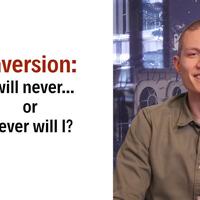Simple Inversion: I will never or never will I? - English In A Minute - YouTube
Never before – probably –
has inversion been explained so quickly or so simply,
so pay attention because that's what we're doing.
Inversion is something we do in English
for emphasis, formality or style.
I will never dance.
This sentence follows normal word order:
subject, auxiliary verb, adverb, verb.
'Never' is a negative or limiting adverb.
Other examples are: rarely, hardly and not often.
First, move the negative adverb
to the beginning of the sentence.
Then invert, or swap,
the order of the subject and auxiliary verb.
Never will I dance.
If your sentence is affirmative
and doesn't have an auxiliary verb
– for example, the present or past simple –
then add one.
Rarely do I wake up on time.
Remember, it's for emphasis!
So only do it for a good reason.

